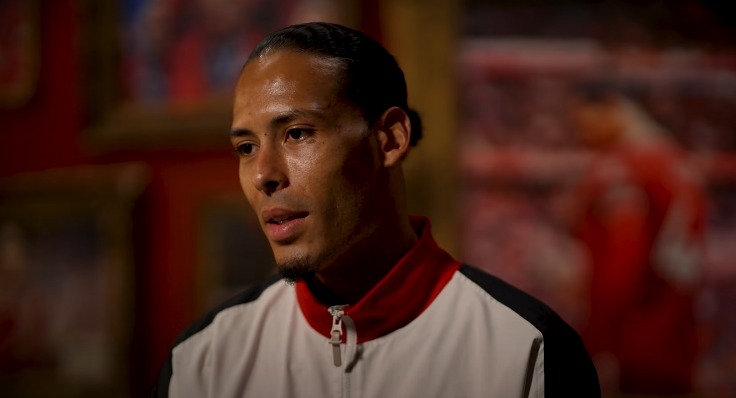The number inked beneath the 2027 expiration date was the true headline when Virgil van Dijk extended his stay at Liverpool last Thursday. His salary of £400,000 a week now ranks among the highest in football, particularly for a center-back who is well into his thirties. Although Van Dijk is more frequently associated with attacking sensations or multinational marketing behemoths, his story demonstrates something subtly revolutionary: defenders can also become valuable icons.
This agreement represents a long-term change rather than a temporary fix. Van Dijk, who was allegedly courted by a number of top European clubs, opted for continuity over change because it was significant rather than because it was simpler. He’s sending a message that goes beyond comfort when he decides to stay a Liverpool mainstay. It’s a strategic wager on legacy, encased in leadership and loyalty.
| Category | Details |
|---|---|
| Full Name | Virgil van Dijk |
| Birth Date | July 8, 1991 |
| Age | 33 |
| Nationality | Dutch |
| Position | Centre-Back |
| Current Club | Liverpool FC |
| Contract Expiry | June 30, 2027 |
| Reported Weekly Salary | £400,000 |
| Estimated Annual Salary | £20,800,000 |
| Market Value | £30 million (approx.) |
| Career Highlights | UEFA Champions League winner (2019), PFA Players’ Player of the Year (2019) |
| Past Clubs | Southampton, Celtic, Groningen |
| Official Profile | Liverpool FC – Virgil van Dijk |
Van Dijk currently lags behind Erling Haaland and Mohamed Salah in the Premier League’s pay scale at this level. However, the organization of that list—rather than its ranking—is what makes it noteworthy. Van Dijk’s contract is said to be straightforward, in contrast to many agreements that are crammed with soft incentives and performance clauses. No fines. No sliding scales. Simply trust, expressed in monetary terms.

In terms of weekly earnings, this puts him in line with Kevin De Bruyne for context. Van Dijk, on the other hand, appears destined to spearhead a new Liverpool era under manager Arne Slot, in contrast to De Bruyne, who is anticipated to leave Manchester City shortly. His contribution has been nothing short of inspirational, especially since he recovered from a serious ACL injury. Van Dijk brings something refreshingly human—comfort under pressure and presence beyond numbers—to a sport that is becoming more and more fixated on data and systems.
Liverpool made a very creative choice with this one. They are changing their approach by rewarding experience instead of pursuing ephemeral potential. The focus has shifted from upside to institutional wisdom. The team is protecting both its identity and its back line with Van Dijk.
The wider implication is even more startling. This agreement contributes to redefining defensive roles’ value. Scorers and playmakers received large sums of money for decades. Nowadays, defenders are pillars rather than accessories, with players like Van Dijk, Matthijs de Ligt, and Reece James dominating back-page economics.
The response has been overwhelmingly positive. Gary Neville highlighted the contract’s symbolic significance by referring to it as “dynasty money,” while Rio Ferdinand celebrated it as a “win for defenders worldwide.” The cultural significance of this moment is further demonstrated by the reported personal congratulations from LeBron James, a co-owner of Liverpool.
Even so, this is a silent celebration of merit as much as it is about money. Van Dijk came back from injury, improved his game, and stayed Liverpool’s pillar of support instead of negotiating with entitlement. In a sport where personalities frequently give way to playbooks, his ability to calm a storm both tactically and emotionally is becoming more and more rare.
By doing this, Liverpool might be providing a model for other teams going through changes. Teams that are struggling to balance youth and tradition, like Real Madrid, PSG, and Bayern Munich, may find it beneficial to put continuity above churn. The lesson here is that experience retention is reinforcement rather than regression.
However, there are risks associated with this pay structure. Negotiations may get more complicated in the future. Van Dijk’s package may have given younger players the confidence to aim higher. There may be minor internal changes to the club’s prior model, which was based on meritocracy and balance. Van Dijk, however, is the player who can carry the weight of expectation without upsetting the peace.
This extension is a victory for the whole Liverpool team, not just Van Dijk, and it sends a message of ambition and cohesion. The Dutch defender’s leadership is still crucial because he is still Liverpool’s defense captain. His ability to organize and inspire his teammates is just as important as his skills on the field. His presence in the locker room is indisputable, and having a talisman like Van Dijk guarantees the continuation of Liverpool’s winning culture as the team attempts to rebuild under Arne Slot. An asset that goes beyond tactical choices or match outcomes is having someone who exudes stability and leadership.
Beyond his technical prowess, Van Dijk’s tenure at the team says a lot about Liverpool’s future goals. The signing shows a dedication to retaining key players who are aware of the club’s principles, as Jurgen Klopp has a history of embracing individuals who are more than just athletes. Van Dijk’s ascent from
Southampton to the top of the world’s defender rankings is evidence of his development as a person and his tenacity, which are difficult traits to duplicate. Younger players at the club can look up to him because of his longevity in a physically demanding role, which serves as both a mentor and a standard for excellence.


